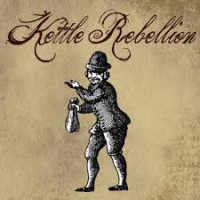It takes guts to put one's awkward teenage photos out there for the world to see. The weirdness or imperfections in the photos isn't overshadowed by inherent cuteness like it is with baby photos, and there isn't the self-confidence and experience of adulthood to guide one's pose in the polaroids. But, that's exactly what Erik Petersen and crew have done by releasing Kettle Rebellion, the complete collection of recordings made by the band that ever so briefly existed between West Chester/Philadelphia punk rapscallions The Orphans and respected, progressive (and also kinda folkish) punk band Mischief Brew.
The story behind The Kettle Rebellion adds a certain intangible magnetism to the album. Originally, Petersen, Chris "Doc" Kulp, and Jon Foy recorded an album's worth of material and played five shows as "Kettle Rebellion," a band as influenced by punk as folk and medieval music. But, after recording the release, the album was stolen from Petersen's house by (asshole) houseguests and put up on Soulseek. For years, the legend of a "lost" Mischief Brew album floated around. Finally, after a number of years, the members were able to reconstruct the album through various files in different places and restore the album to its original form.
As album opener "Seeking the Brave" clearly shows, the album is sonically and thematically between the Orphans and Mischief Brew, though it learns more towards the later. In fact, several songs, including "A Liquor Never Brewed" and "The Master is a Drunkard" would later be recorded as Mischief Brew songs. But, there are significant differences between Mischief Brew and Kettle Rebellion. For one thing, here, Petersen is still growing as a songwriter. One of the things that elevates Mischief Brew so far above its contemporaries is the bands to write fundamentally good songs- tunes based in interesting melody that grows in shape, color, and intensity until the end of the song. On Kettle Rebellion, the influence of the original anarcho-rockers are more evident. In lieu of swinging melody, the songs here are mostly hard chargers, with all instruments, from guitars, to mandolins, to even voices, acting as hard percussion, storming forward.
The result is a raggedy, rowdy, release that is as much a drunken, barroom party as it is a studio recording. Whereas Mischief Brew songs are generally compact untis, songs here often have two or three parts, growing in intensity, changing course at unexpected moments. It adds to the chaos, but also reveals the band isn't as in control of their drives as they would like.
Even more, the band is feeling out how much they wan to be influenced by folk and the tunes of the dark ages. "Barraty Call" sounds like a bunch of sailors floating up to the dock, ready to get drunk on rum and frisky with maidens. But yet, a slight middle eastern rhythm sneaks in. In contrast, "Away with Purity" is basically a Subhumans tune, particularly when it flirts ever so briefly with reggae bounce. "Storming the Castles," with it's huge, slashing guitars and monotone group chants could fit into the Antisect discography. Thrilling!
Throughout the songs, the band is looking outward, commenting on classist systems, economics, race relations, and more classist systems. Rarely, if ever, do they betray how they feel personally. It betrays the band's youth at the time of these recordings. How can a man make grandiose statements without having slain dragons or sailed seas himself? In some ways, those unaffected by the rigors of life are more apt to comment on scales and systems because they have not yet been battered into a subjective point of view. Interestingly, the last Mischief Brew LP, The Stone Operation. featured mostly introspective songs, with some introspections being used to comment on greater matters.
Petersen has taken alternating stances on this recording. At times he's stated a fond remembrances of the band that would lead to what he probably sees as his most important music project, and at others, he's been somewhat embarrassed to show his "adult" band in its infant stage. Truthfully, there is a limited amount of Questing here, with references to siege warfare and⦠well⦠the mandolin pretty much immediately conjures up visions of dancing hobbits with pipe smoking Wizards watching in amusement. But, the fact is, there's nothing to be embarrassed about here. These songs might not quite have the craft of Mischief Brew, but they blast forward with such intensity and recklessness that it's not only a wild ride, but one of the most clever constructs from the time period. This is a band doing what it wants to do without regard for what others might think of it, and that in of itself, makes it a confident, unique release that, much like those photos of your younger self, deserves to be framed and appreciated.
